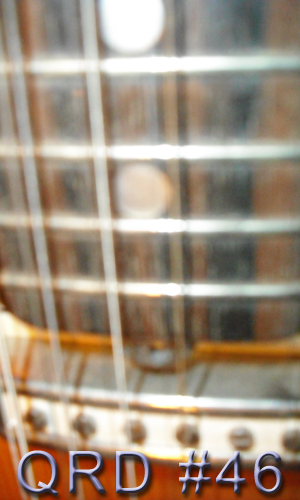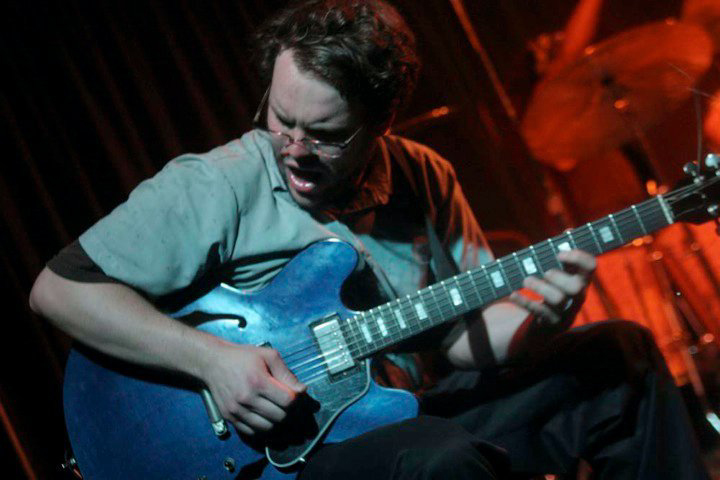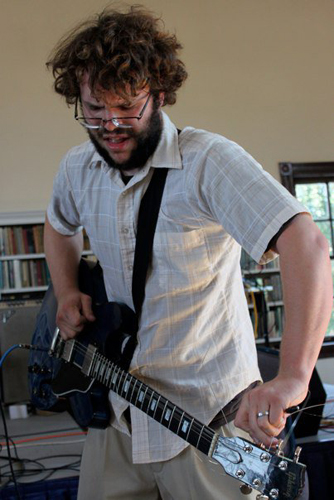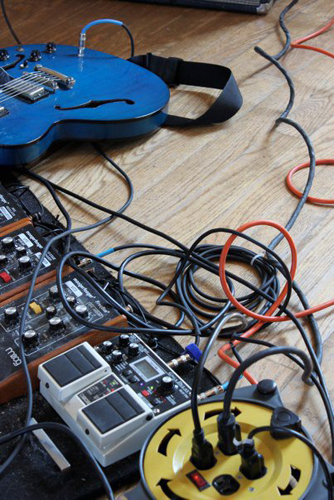





















December 2010


Bands: Matta Gawa; New Atlantis Collective; Quartet w/Herb Robertson, Jason Ajemian, Andrew Barker; Quartet w/David Taylor, Dominic Duval; collaborations with Peter Brotzmann, Marc Edwards, G. Calvin Weston, Marshall Allen of the Sun Ra Arkestra, etc.
Websites: www.myspace.com/mattagawa, www.newatlantiscollective.com
Photos - musician, equipment, etc
MP3s - 196kbps to stream while people read
QRD – What was your first guitar & what happened to it?
Ed – My first guitar was a Fernandez Decade - a copy of a Fender Jaguar. I tried everything possible to turn it out & make it something unique - different pickups & other modifications without necessarily understanding what these things would do to the tone of the guitar.… I ripped all those modifications out a couple of years ago, sanded the finish down to natural, & I’m going to put some single coils in it & hopefully use it again. It’s sitting in a case in the closet right now, in pieces!
QRD – What’s your typical set-up from guitar to effects to amplifier?
Ed – I generally run the same rig, regardless of the project, for the sake of convenience & to maintain the integrity of all my cables & what not - this means I probably play through much more than I use for any one gig. I run a Gibson ES-335 into a Teese Picture Wah, Boss PS-3, Boss DD-2, Ampeg Sub-Blaster, Crowther Hot Cake, Boss DD-3, Klon Centaur, Catalinbread Semaphore, Sweetsound Mojovibe, a custom 4ms Photocell Delay, Moog Ring Mod, Moog Phaser, Moog Freq-Box, Boss DD-20, Boss PS-5, Akai Headrush, Boss PS-2, & an Electro Harmonix Holy Grail into a ‘66 Fender Bandmaster w/a 2x12” cabinet (with one Celestion G12h30, one Celestion Vintage 30). Now I’m sending an out from my Headrush or my DD-20 into a Gallien-Krueger GK-400RB pushing a Mesa/Boogie Road-Ready 1x18” (a monster cabinet built into a flight case!) to reinforce some of the loop stuff that I do.
QRD – What’s the most important part of your rig – guitar, amplifier, or effects?
Ed – Generally, any nice guitar into a tube amp will do me fine, with or without effects, but I am definitely partial to my own guitar - an ES-335 with an ebony fretboard - the humbuckers help keep the signal hot & the semi-hollow body feeds back beautifully!
QRD – What’s your main amplifier & why?
Ed – Though I primarily play improvised music, I grew up playing punk & rock influenced by releases on Touch & Go, Dischord, Homestead, & SST. Before downsizing to the ‘66 Bandmaster, I was running a Sunn Model T into an Ampeg V4 4x12”. To get a good sound out of a tube amp, you need to turn up the juice & get it to sing - & while it is impossible to capture the massive bottom-end resonance of a nice 4x12”, turning up a 100+ watt amplifier like the Model T to hit its sweet spot it kind of impractical when you’re playing improvised music - the Bandmaster is a solid simple circuit & it is not as obscenely loud as the Model T, even when you turn it up - so I guess the defining characteristic I value here is “versatility.”
QRD – What’s your main guitar & what are the features that make it such?
Ed – It is a Gibson ES-335 with an Ebony fretboard & block inlay. It is a “limited edition” model from 1999 that I found in the Czech Republic at a ridiculously low price - & it is blue.
QRD – If you had a signature guitar, what would it look like & what would some of its features be?
Ed – I guess it would have to be this ES-335.
QRD – If you had a signature pedal, what would it be & what would some of its features be?
Ed – My 4ms Photocell/LFO delay is a custom job- it is basically a slap-back delay that can be synched to an LFO, & controlled with an expression pedal - the rate can also be controlled by a foot-switchable photocell, for some pretty wild sounds.
QRD – How many guitars do you own?
Ed – Right now I just have 3 & a bass.
QRD – How & where do you store your guitars?
Ed – In the closet, in their cases.
QRD – What do you wish guitar cases had that they usually don’t?
Ed – Cases are fine the way they are!
QRD – What features do you look for when buying a guitar?
Ed – I try not to buy guitars any more. I generally look for sustain & a nice full tone. Unless you want something else... I think it depends on the application you’re purchasing for.
QRD – How much do you think a good guitar should cost?
Ed – Fender recently upped their prices & the nice Gibsons are almost all overpriced custom jobs. Guitars are way more expensive than they should be - a nice guitar will probably cost a couple of grand, but I would obviously prefer to pay much less.
QRD – Do you upgrade & customize your guitars or just stick with what you get?
Ed – I try to buy what I need & stick with it or sell it!
QRD – How thoroughly do you research or test a piece of equipment before buying it?
Ed – Typically, I’ll check out what I can online, but I need to actually get my hands on something before I buy it.
QRD – Do you change your rig around often?
Ed – Not anymore!
QRD – Are you after one particular guitar tone & locking into it, or do you like to change your tone around a lot?
Ed – I do try to change tones as often as possible, for variety’s sake.
QRD – What are some guitars, amps, & pedals you particularly lust after?
Ed – I actually have my needs met right now- but I would love to get my hands on a Fender Bass VI or 1960s SG - also looking at getting a decent vintage combo & something low-wattage with EL84s.
QRD – What do you think are some important features to be on a person’s first guitar that aren’t always there?
Ed – Generally, the necks suck & are poorly finished - for example, sharp frets on student guitars overhang & poke over the edge of the neck/fretboard. That can easily discourage a kid from playing.
QRD – What have been the best & worst guitar related purchases you’ve made?
Ed – Everything I have now, I love. The ES-335 is particularly special - I haven’t made too many terrible purchases, & when I do, I try to unload them as quickly as possible. I had a great DOD Buzz Box that was fun, but I never really used it & it’s gone now unfortunately.
QRD – What are some effect, amp, & guitar brands you particularly like or dis-like & why?
Ed – No qualms with anybody here!
QRD – What’s the first thing you play when you pick up a guitar?
Ed – I try to keep it fresh & just play.
QRD – How old were you when you started playing guitar?
Ed – I was 14.
QRD – At what age do you think you leveled up to your best guitar playing?
Ed – Hopefully I am still on my way there.
QRD – Why do you think a guitar fits you more so than other instruments?
Ed – Guitar is just an instrument with a specific (though dynamic & multi-faceted) function - I try to play as many instruments as I can.
QRD – Do you think guitar should be people’s first instrument as often as it is?
Ed – Drums were my first instrument, & I still love to play them. I think people should play whatever they are most drawn to & enjoy it! Though people have many great opportunities to make valuable statements with music, the process is supposed to be fun - & if people aren’t doing what they want to do with their “hobby time”, they will probably not stick with it & do something else.
QRD – Do you see your guitar as your ally or adversary in making music?
Ed – It’s definitely an ally with a very useful purpose & whole range of unique applications.
QRD – Who are the guitarists that most influenced your playing & sound?
Ed – Some favorites include Sonny Sharrock, Duane Denison from the Jesus Lizard, Fred Frith, Hendrix, Greg Ginn, Derek Bailey, Bern Nix, Masayuki Takayanagi, Marc Ribot, Agostino Tilotta from Uzeda, etc.
QRD – Do you think people anthropomorphizing their guitars is natural or silly (e.g. naming their guitar)?
Ed – This is not for me to judge!
QRD – What’s the most physical damage you’ve done to a guitar & how did you do it?
Ed – I take good care of my gear & have so far been blessed with only minor scratches.
QRD – What do you do to practice other than simply playing?
Ed – Nothing. I try to simply play as much as possible. I’d like to slow things down & play more on my own later this year!
QRD – How many hours a week do you play guitar & how many hours would you like to?
Ed – I generally play for at least 3-6 hours per week. I would like to play much more frequently. It really depends on whether I am in “gig mode” or “rehearsal mode” & what else is happening with curating my live music series & all that stuff. If possible, I would be playing all the time.
QRD – What type of pick do you use & why?
Ed – I use a Dunlop .88 Tortex pick, but may need to switch to something heavier!
QRD – What gauge strings do you use & why?
Ed – I use D’Addario 11s, but my Telecaster is strung with D’Addario 12s.
QRD – How often do you change strings?
Ed – Usually after every gig - if I’m on the road, then I change strings after every three gigs.
QRD – How often do you break strings?
Ed – If I don’t change them after every gig, it becomes possible for me to break them the next day.
QRD – Which do you feel is more proficient, your strumming hand or fretting hand & how does that effect your style?
Ed – They’re not quite equal, but generally, they can work together pretty well. My picking hand has to work a lot less.
QRD – Do you set-up your guitar yourself or send it to a guitar tech (or not set it up at all) & why?
Ed – I try to work on it myself, but often use a guitar tech to save myself the time.
QRD – What tunings do you use & why?
Ed – I stick to standard tuning but mess around with a host of different tunings that sound pleasing to me.
QRD – Do you prefer tablature, sheet music, or some other notation system for writing down your own ideas?
Ed – I generally don’t keep notes of what I’m working on & try to record ideas I would like to save for later. I prefer using abstract/graphic notation or simple tablature to get ideas across, but really it depends on the idea & who I’m presenting it to.
QRD – How high do you hold your guitar when playing (strap length)?
Ed – Around my waist.
QRD – What’s a bad habit in your playing you wish you could break?
Ed – I have been working on not using clichés, or stock phrases - I hate repeating myself musically & try to break free from repetition or copying myself.
QRD – Playing what other instrument do you think can most help someone’s guitar playing?
Ed – Drumming helps, but I think musically inclined people should bite the bullet & just play everything they can get their hands on.
QRD – What’s a type of guitar playing you wish you could do that you can’t?
Ed – My fingerstyle playing needs work.
QRD – What’s a guitar goal you’ve never accomplished?
Ed – Probably fingerstyle playing - it needs work!
QRD – What’s the last guitar trick you learned?
Ed – Most of the tricks I’m learning involve tricks & techniques with pedals. My duo Matta Gawa with drummer Sam Lohman involves a lot of real-time looping of textures & “bass” lines all generated from the guitar & then blowing over the top of the loops. There’s plenty of cool loop manipulation & guitar processing, that often strikes me as stuff I haven’t done before. I try to play in a whole range of different settings, so that I’m forced to come up with new “tricks” on the fly.
QRD – What’s your favorite guitar gadget (ebow, capo, slide, string cutter, etc)?
Ed – I’m not a gadget man!
QRD – Did you ever take guitar lessons & if so, what did you learn from them?
Ed – I took some lessons from a great instructor in Prague named Tony Ackerman - an outstanding person & instructor & a student of the great trumpeter (& avant jazz legend) Bill Dixon. He really encouraged me to jump in & just play & it wasn’t until years later that I recognized his connection to improvised music after reading an interview with him online. He succeeded in piquing my interest about music & did so with positivity & creativity that many guitar teachers are sorely lacking. I also took classes at Berklee, though they were primarily Gen Ed courses unrelated to music.
QRD – What would you teach someone in a guitar lesson that you don’t think they would generally get from a guitar teacher?
Ed – I think being able to trace a major scale up the whole neck of the guitar is a pretty important fundamental that keeps a lot of guitarists from soloing very early on in their relationship with the guitar. Once you can do that, you can play along to pretty much anything.
QRD – What’s something someone would have to do to emulate your style?
Ed – I try not to have just one style - hopefully the records I am making are different enough from one another to throw people off of my bag of tricks.
QRD – What’s your take on tremolo systems?
Ed – If you’re talking about whammy bars, they’re a drag & high maintenance, but some of them can do what they’re designed to do without knocking you out of tune. If you’re talking about tremolo pedals or vibrato units in amps, they’re OK in my book!
QRD – How often do you adjust your tone knob?
Ed – Often!
QRD – What do you see as the difference between lead guitar & rhythm guitar players?
Ed – In much of the music I listen to, the guitarists I really enjoy most are players who can bridge the gap & accomplish both at once - stepping up front & moving the melody along like a soloist, but still laying the rhythmic/harmonic foundation that rhythm guitarists are expected to accomplish - I am not a huge fan of the idea of anyone being a dedicated “lead” or “rhythm” guitarist! The instrument allows for you to do both & any good soloist should be making a solid & unique rhythmic statement as well.
QRD – If a band has good guitar work, can you ignore the rest of the band not being good?
Ed – Everything needs to be firing on all cylinders to make a record work for me. Might be easier to listen to a bad guitar player with a killer band then a “good” guitar player with a terrible band.
QRD – What famous musician’s guitar would you like to own & why?
Ed – I would probably go with Steve Albini’s Travis Bean. Those guitars are very special instruments & Albini has been a significant musical figure to me. He has obviously had some pretty outstanding guitar tones.
QRD – Who do you think is currently the most innovative guitar player & why?
Ed – Kazuo Imai, Olaf Rupp, & Bill Horist are all outstanding, unique guitarists.
QRD – Where can people hear your best guitar work?
Ed – It is still to come- I would recommend some of the forthcoming Matta Gawa stuff to anyone interested in hearing the noisier/rockier/effects-drenched side of my playing. The two quartet records - one with Herb Robertson (trumpet), Jason Ajemian (bass), & Andrew Barker (drums), the other with David Taylor (bass trombone), Dominic Duval (bass), & Jay Rosen (drums), & the New Atlantis Octet records with Roy Campbell Jr. (trumpet), Steve Swell (trombone), Aaron Martin (alto), Jason Ajemian + Vattel Cherry (bass), & Sam Lohman & Andrew Barker (drums) are all decent examples of my playing in a jazz context.
QRD – Anything else?
Ed – Thanks very much!







